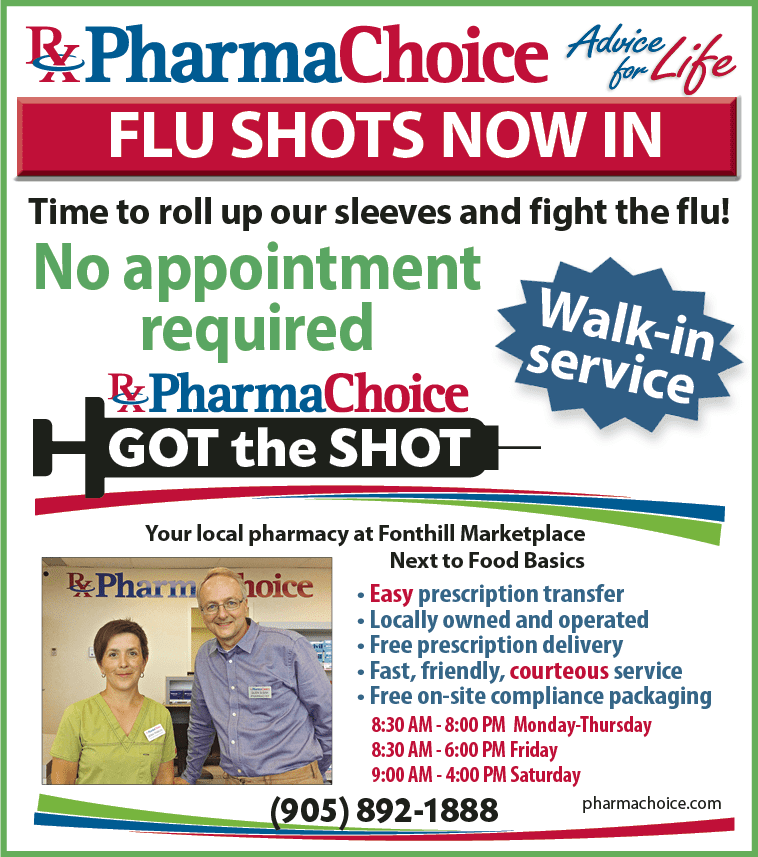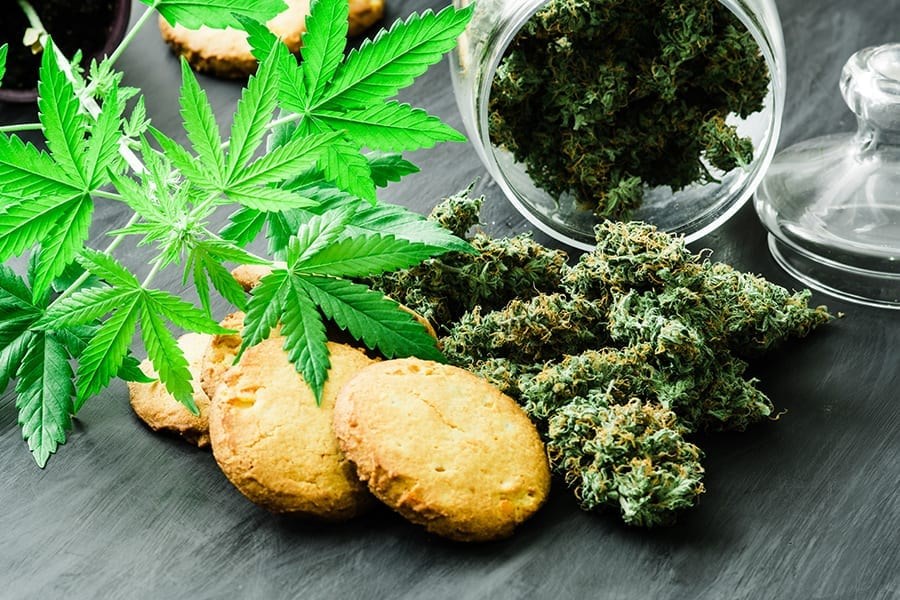Answers to some commonly asked questions
BY VOICE STAFF
With the recreational use of marijuana officially legal, here are answers to questions about what is, and is not, permitted. Compiled from the Government of Ontario's, CAA Niagara, Niagara Region, and, Health Canada.
Why did the federal government legalize and regulate cannabis?
The new legal framework takes a public health approach to cannabis legalization and regulation.
The new law will help to better prevent youth from accessing cannabis, displace the illegal cannabis market and protect public health and safety with product quality and safety requirements for cannabis.
 Where can I buy recreational cannabis?
Where can I buy recreational cannabis?
As of October 17, the Ontario Cannabis Store website is the only legal option for people 19 and over to purchase cannabis, following federal government guidelines. Online orders will be delivered safely and securely. Consumers will be required to verify their age to accept delivery and no packages will be left unattended at the door.
The government has also introduced legislation that, if passed, would help the province move forward with a tightly regulated private retail model for cannabis that would launch by April 1, 2019. The legislation would establish the Alcohol and Gaming Commission of Ontario (AGCO) as the provincial regulator authorized to grant store licences. The Ontario Cannabis Store would be the exclusive wholesaler to these stores. Private stores would be introduced with strict controls to safeguard children and youth and combat the illegal market.
How much can I buy at one time?
Users will be able to purchase up to 30 grams (about one ounce) of dried recreational cannabis at one time for personal use. This also the maximum legal amount anyone can possess in public at any time.
How many plants may I have in my residence?
The Cannabis Act will permit adults to cultivate up to four cannabis plants per household (not per person). Provinces and territories have the flexibility to apply added restrictions on personal cultivation. There are recommended safety and security measures for growing plants that should be considered, such as safe storage and proper ventilation.
Where can I legally smoke and vape cannabis?
Cannabis may be smoked in private residences (excluding residences that are also workplaces), many outdoor public places, designated guest rooms in hotels, motels and inns, residential vehicles and boats that meet certain criteria, scientific research and testing facilities, and controlled areas in long-term care homes, certain retirement homes, residential hospices, provincially-funded supportive housing and designated psychiatric facilities or veterans’ facilities.
Additional restrictions on smoking and vaping may exist in municipal bylaws, lease agreements and the policies of employers and property owners.
 Where is it illegal to smoke or vape cannabis indoors?
Where is it illegal to smoke or vape cannabis indoors?
Users may not be permitted to smoke or vape cannabis in: indoor common areas in condos, apartment buildings and university/college residences, enclosed public places and enclosed work places, non-designated guest rooms in hotels, motels and inns
In schools and places where children gather, it is illegal to smoke on school grounds and all public areas within 20 metres of these grounds, on children’s playgrounds and public areas within 20 metres of playgrounds, in child care centres, or where an early years program is provided and in places where home child care is provided – even if children aren’t present.
At hospitals, hospices, care homes and other facilities it is illegal to smoke or vape cannabis within nine metres from the entrance or exit of public and private hospitals, psychiatric facilities, long-term care homes, independent health facilities, on outdoor grounds of public and private hospitals and psychiatric facilities and in non-controlled areas in long-term care homes, certain retirement homes, provincially-funded supportive housing, designated psychiatric or veterans’ facilities, and residential hospices
In publicly-owned spaces, smoking or vaping cannabis is disallowed in publicly-owned sport fields (excluding golf courses), nearby spectator areas and public areas within 20 metres of these areas.
For vehicles and boats, you cannot consume cannabis (smoking, vaping, eating) in a vehicle or boat that is being driven or is at risk of being put into motion.
Other outdoor areas in which users need to refrain from cannabis use includes restaurants and bar patios and public areas within nine metres of a patio, on outdoor grounds of specified Ontario government office buildings, in reserved seating areas at outdoor sports and entertainment locations, grounds of community recreational facilities and public areas within 20 metres of those grounds, and in sheltered outdoor areas with a roof and more than two walls which the public or employees frequent, or are invited to (e.g. a bus shelter).
Operating motor vehicles while impaired
Using cannabis and driving is illegal and dangerous. Cannabis, like many other drugs, slows reaction time and increases a driver’s chances of being in a collision.
If a police officer finds that that anyone is impaired by any drug, including cannabis, they will face serious penalties, including an immediate licence suspension, financial penalties, possible vehicle impoundment, possible criminal record and possible jail time.
Police officers will be authorized to use oral fluid screening devices at roadside. Once a federally approved device is available, the Niagara Regional Police will implement the use of those devices to help enforce the law.
There will be a zero tolerance policy for young, novice and commercial drivers.
These drivers are not allowed to have any cannabis in their system (as detected by a federally approved oral fluid screening device) if they are driving a motor vehicle and are 21 or under, have a G1, G2, M1 or M2 licence, the vehicle being driven driving requires an A-F driver’s licence or Commercial Vehicle Operator’s Registration (CVOR) or are driving a road-building machine.
How does cannabis affect driving ability?
The active ingredient, THC (tetrahydrocannabinol), travels through the body and into the brain, affecting the brain cells and creating a high. THC can take a long time to exit the body and the length of time becomes even longer for regular cannabis users.
Whether it is smoked, vaped or indigested, the THC in cannabis can impact cognitive skills, affecting coordination, reaction time, concentration, decision-making abilities and ability to judge distances.
Can I vape or smoke marijuana at my workplace?
Ontario has strict regulations in place to ensure all workplaces are safe. Consuming recreational cannabis in the workplace is illegal.
Employers and supervisors will need to know the rules for medical cannabis and will be required to address workplace hazards, under the Occupational Health and Safety Act (OHSA)
Employees and workers should know that using cannabis at the workplace could deem them unable or unfit to work safely and be a workplace hazard to themselves or to others. They also have a duty to perform work safely and to report any hazards to their supervisor or employer under the OHSA.
How does this affect medical cannabis usage?
Medical cannabis is subject to different rules than recreational cannabis. The production and sale of medical cannabis is regulated exclusively by the federal government. If a health care professional has already authorized you to use cannabis for medical reasons, your access will not change when recreational cannabis is legal.
The only way to purchase medical cannabis is from a federally-licensed producer online, by written order or over the phone and delivered by secure mail.
Individuals can also receive a licence from Health Canada to grow their own medical cannabis or designate someone else to grow it on their behalf.
Can I travel to the United Stated with marijuana?
Despite the fact that cannabis is legal and regulated in Canada, it will continue to remain illegal to transport cannabis across Canada's national borders.
This prohibition applies even if a person is authorized to use cannabis for medical purposes, no matter the amount and even if travelling to or from an area where cannabis has been legalized or decriminalized.
Anyone entering Canada with cannabis in any form must declare it to the Canada Border Services Agency (CBSA). Not declaring cannabis at the Canadian border is a serious offence. You could face arrest and prosecution.
Can I travel internationally with cannabis?
It is illegal to take cannabis across Canada's international borders. Individuals could be subject to criminal charges if they try to travel to other countries with any amount of cannabis.
As cannabis is illegal in most countries, entry can be denied to another country if an individual has involvement in the legal cannabis industry in Canada or previously used cannabis or any substance prohibited by local laws
Travellers must inform themselves about the laws of the country they intend to visit, and this includes the legal status of cannabis use and possession. It is advised that travellers must obey the laws of the country they are visiting, as that country’s consequences for possession or use could be severe.
Can I travel with cannabis within Canada?
When are travelling within Canada, it is the traveller’s responsibility to learn the laws of the province or territory you are going to. It is advised that if people use cannabis, purchase and consume it within the province or territory they are in and follow the laws that are in place.
Who helped form and provide input on Ontario guidelines?
The Province of Ontario consulted extensively with other jurisdictions that already legalized cannabis, public health experts, law enforcement, municipalities and business and consumer groups
In addition, Ontarians shared their views on legalization in a survey.
Some key results from the survey that informed the plan included:
• 86 percent of people said they support a minimum age of 19
• 74 percent believe there should be restrictions on where cannabis can be consumed
• 61 percent of respondents agreed that drug-impaired driving penalties should be stricter
69 percent believe that keeping cannabis out of the hands of youth is important
Are there health risks?
Health Canada states that marijuana, like alcohol and tobacco, poses a number of health risks. Cannabis should not be used if a woman is pregnant or breastfeeding. It poses a risk to the fetus or newborn child. Heavy cannabis use has been linked to lower birth weight, plus other health risks associated with cannabis use during pregnancy and breastfeeding.
At any age, cannabis use affects the way the brain functions. This includes impacts on attention, memory and learning. The brain does not stop developing until around age 25. The younger people begin use and the more often and the longer it’s used, the more likely that it will have a bigger impact on brain function.
Cannabis should not be used if an individual may be predisposed to or have a family history of psychosis or problematic substance use.
Cannabis can be addictive. Close to one in three people who use cannabis will develop a problem with their use. Close to one in 10 people who use cannabis will develop an addiction to it. This statistic rises to about one in six for people who started using cannabis as a teenager.
Cannabis addiction can cause serious harm to your health, social life, schoolwork and work and financial future.



